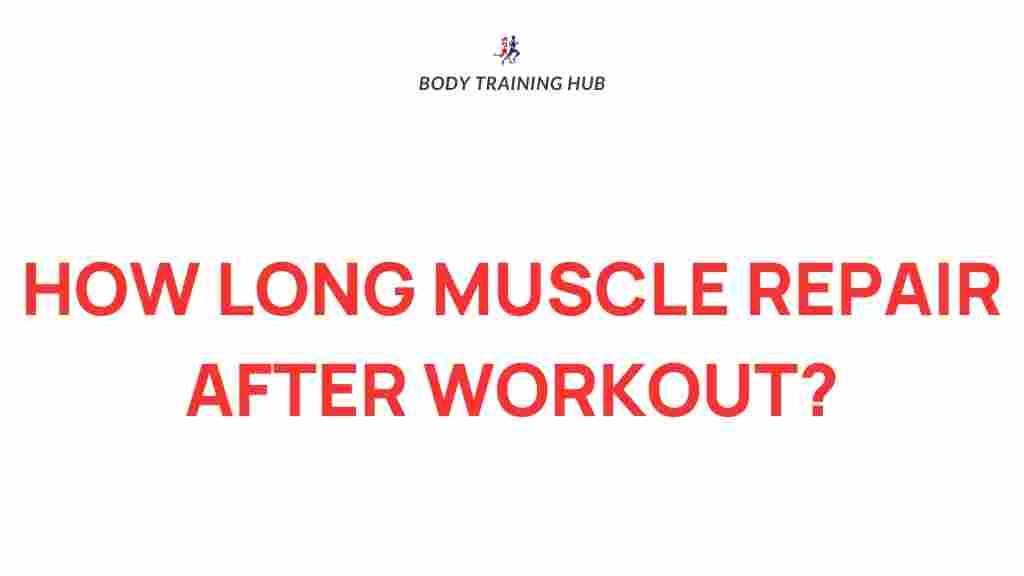Unveiling the Secrets of Muscle Repair Post-Workout
After an intense workout, your body enters a crucial phase known as muscle repair. Understanding this process is essential for anyone looking to enhance their performance, minimize injury risk, and improve overall fitness. In this article, we will delve into the various aspects of workout recovery, including the science behind muscle recovery time, effective strategies for exercise regeneration, and tips for optimal post-exercise healing.
The Science Behind Muscle Repair
Muscle repair is a complex biological process that occurs after physical exertion. When you engage in strenuous activities, tiny tears occur in your muscle fibers. This microtrauma is a normal part of strength training and exercise, leading to muscle growth and increased strength over time. Here’s a breakdown of the muscle repair process:
1. Inflammatory Response
Immediately after a workout, your body responds with inflammation. This is a natural reaction where white blood cells and various growth factors flood the area to begin the healing process. While it may sound detrimental, this inflammation is essential for muscle recovery.
2. Muscle Fiber Repair
Following the inflammatory response, the body initiates the repair of damaged muscle fibers. Satellite cells, a type of stem cell, activate and proliferate. These cells fuse to the damaged fibers, helping to restore muscle integrity. This process ultimately leads to muscle hypertrophy, or growth, which is why consistent training is vital.
3. Recovery and Regeneration
The final stage of muscle repair involves recovery and regeneration. This is where adequate nutrition, hydration, and rest come into play. Proper post-workout care can significantly influence your muscle recovery time.
Factors Influencing Muscle Recovery Time
The time it takes for your muscles to recover can vary significantly based on several factors:
- Intensity of the workout: Higher intensity workouts typically result in longer recovery times.
- Type of exercise: Resistance training may cause more microtrauma than aerobic exercises.
- Nutrition: Proper intake of protein and carbohydrates post-exercise is crucial for muscle repair.
- Hydration: Staying hydrated aids in nutrient transport and recovery.
- Sleep: Quality sleep is essential for hormonal balance and physical recovery.
Effective Strategies for Post-Workout Recovery
To optimize muscle repair and reduce overall recovery time, consider the following strategies:
1. Nutritional Support
Your body requires adequate nutrients to facilitate post-exercise healing. Focus on a balanced diet that includes:
- Protein: Essential for muscle repair. Consider sources like chicken, fish, beans, and protein shakes.
- Carbohydrates: Replenish glycogen stores with whole grains, fruits, and vegetables.
- Healthy Fats: Support overall health with avocados, nuts, and olive oil.
2. Hydration
Hydration plays a pivotal role in recovery. Water helps transport nutrients and remove waste products from your body. Aim to drink at least 8-10 glasses of water daily, and consider electrolyte drinks after intense workouts.
3. Active Recovery
Engaging in low-intensity activities on rest days can promote blood flow and aid in recovery. Activities like walking, yoga, or swimming can help in exercise regeneration.
4. Stretching and Mobility Work
Incorporating stretching and mobility exercises into your routine can help alleviate tension and improve flexibility. Dynamic stretching before workouts and static stretching afterward can enhance recovery.
5. Sleep and Rest
Never underestimate the power of sleep. Aim for 7-9 hours of quality sleep each night to allow your body to repair and regenerate fully. Consider establishing a bedtime routine to improve sleep quality.
Troubleshooting Common Recovery Issues
Even with the best strategies in place, you may encounter roadblocks in your recovery journey. Here are some common issues and solutions:
1. Prolonged Soreness
Experiencing soreness that lasts more than a few days can be a sign of overtraining or inadequate recovery. To address this:
- Incorporate more rest days into your routine.
- Evaluate your nutrition and hydration habits.
- Consider consulting a fitness professional for workout modifications.
2. Fatigue
If you find yourself constantly fatigued, it may be a sign that your body isn’t recovering properly. To combat fatigue:
- Assess your sleep patterns and ensure you’re getting enough rest.
- Check your diet for deficiencies.
- Incorporate stress management techniques, such as mindfulness or meditation.
3. Increased Injury Risk
Frequent injuries may indicate inadequate recovery practices. To reduce injury risk:
- Pay attention to your body’s signals; don’t ignore pain.
- Gradually increase workout intensity to prevent overuse injuries.
- Include strength training to support joint stability.
Conclusion
Understanding the intricacies of muscle repair post-workout is vital for anyone serious about fitness. By implementing effective recovery strategies, you can enhance your performance, reduce muscle recovery time, and promote better overall health. Remember, recovery is just as important as the workout itself. Invest time in proper nutrition, hydration, and rest to optimize your body’s natural ability to heal. For more tips on improving your recovery process, check out this resource on workout recovery techniques.
Ultimately, embracing the journey toward optimal post-exercise healing will lead to a stronger, healthier you. Listen to your body, be mindful of your recovery strategies, and enjoy the fruits of your labor in the gym!
This article is in the category Strength & Recovery and created by BodyTraining Team
